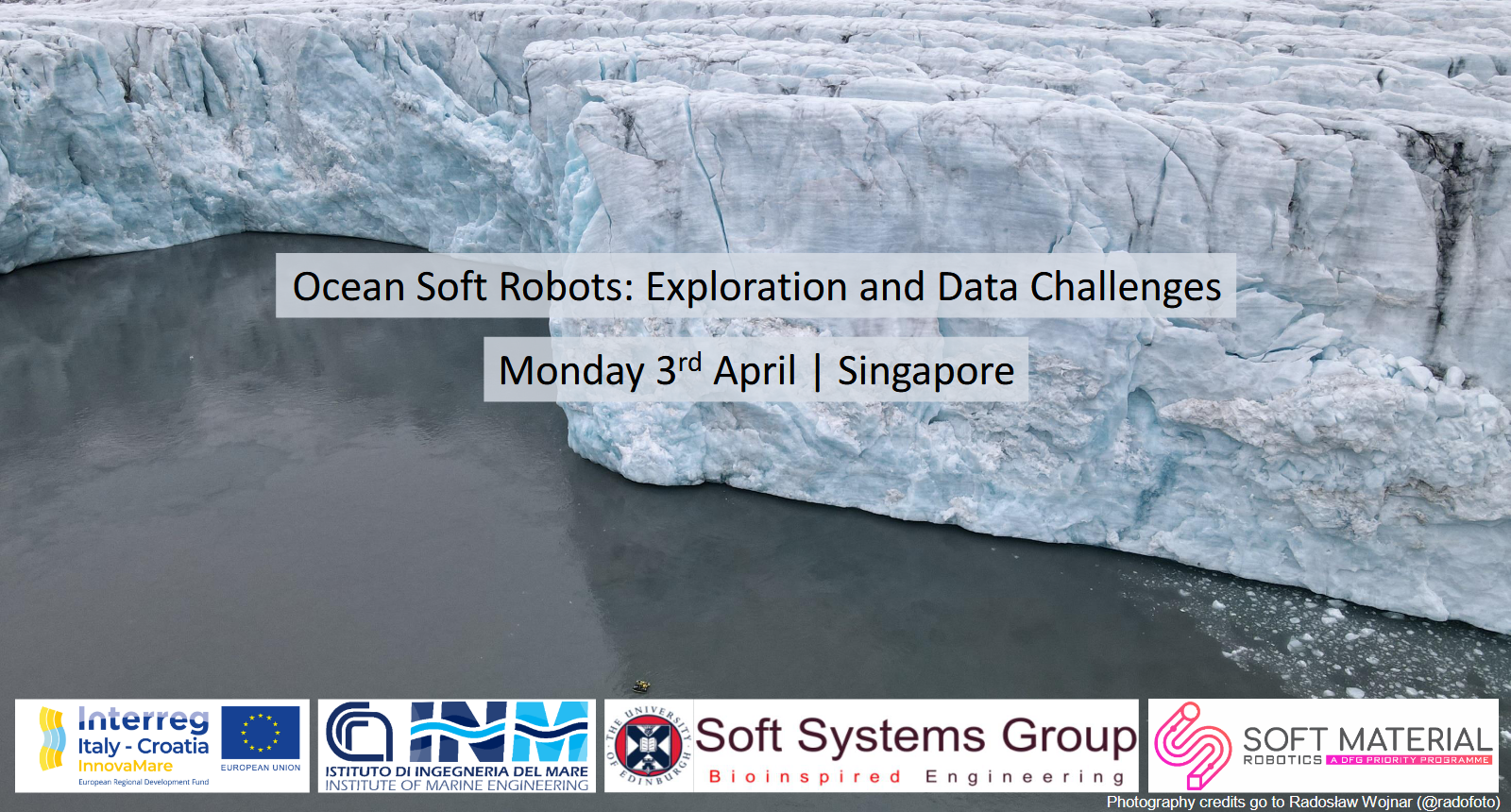
The ocean is still largely unexplored, although it is fundamental to regulate the world’s climate and host a vast range of human activities. Most of the marine realm is an inhospitable environment for humans, hence robots are the ideal allies to further explore and observe it. Nevertheless the innovation rate in marine robotics is slow when compared, for instance, to industrial robotics. Novel robotic platforms play a central role in pushing the boundaries and reducing the carbon footprint of ocean observations, more so soft robots, that can embed biocompatible materials and glide through unexplored areas thanks to their intrinsic dexterity and scalability.
The increasing importance of the role of marine robotics in Earth sciences shed light, among other things, on a considerable gap in data treatment. The data policy in robotics is still far away from the more structured one in observational marine sciences. The lack of a standardised approach hinders the reproducibility of experiments and in-situ deployments, besides nullifying the validation of the gathered environmental dataset, whose value and traceability decrease drastically. The proposed workshop also intends to discuss data policy treatment in marine soft robotics, extrapolating internationally consolidated standards and guidelines from the ocean observational community to be discussed and embedded in aquatic soft robotics. The introduction of persistent standards for soft robotics and soft robotics systems would also accelerate the development of control architectures and digital twins. Oceanographic data benefit from a long tradition of international, multiplatform and cross-time studies, hence these data also respond to well established standards, which to the scope of this workshop can be summarised through the FAIR principles: Findability, Accessibility, Interoperability and Reusability.
To value the role of soft robotics in reaching the sustainable Development Goals, such as innovation, life below water and climate action, it is paramount to integrate the mission of rising eco-robotics with the global observational effort. The rising field of marine soft robotics offers unique opportunities to develop entirely new operational methodologies and scale human activities across the world's ocean. The discussion hosted within the workshop wants to inspire fundamental studies and to focus the potentialities of soft systems paradigms on the underwater environment. Scientists from different branches of ocean science and robotics science will discuss their most pressing demands for marine exploration that can be met by soft robotic solutions. After identifying current applications of marine soft robotic systems, the discussion will highlight opportunities for soft robots dedicated to safeguard and explore the ocean. The ultimate output of the meeting will be released in the form of guidelines for employing soft robots to get the ocean observations that we need the most.
We are calling for contributions to our Robosoft 2023 workshop. We would like to invite the attendees to submit their extended abstract presenting their soft robotics work. The accepted contributions are asked to prepare a short presentation that will be held during the workshop. The workshop is planned as an in person event. The best contribution will be awarded a certificate.
Please note that the accepted extended abstracts in this workshop will not be published in the conference proceeding.
| Topic | Time (SGT) | Program/Speaker |
| Welcome message | 08:30-08:40 | Organizers |
| Opening talk | 08:40-09:10 | Daniela Rus |
Session I: Understanding the Ocean: How can we help? | 09:10-09:30 | Mrudul Chellapurath |
| 09:30-09:50 | Marcello Calisti | |
| 09:50-10:05 | Tea Break | |
| 10:05-10:25 | Rebecca Kramer-Bottiglio | |
| 10:25-10:55 | Tom Kwasnitschka | |
| 10:55-11:25 | Serena Teo | |
| Teaser talks | 10:25-10:55 | Authors |
| Discussion | 11:40-12:30 | What do we need and how can we help? |
| Lunch break | 12:30-13:30 | |
| Welcome message & Session opening talk | 13:30-13:35 | Organizers |
Session II: The Data Challenge for Soft Robotics in Marine Sciences
| 13:35-13:55 | Angelo Odetti & Gabriele Bruzzone |
| 13:55-14:15 | Francisco P. Chavez | |
| 14:15-14:35 | Constanza Armanini | |
| 14:35-14:55 | Amir Gat | |
| 14:55-15:15 | Emma Heslop | |
| 15:15-15:30 | Tea Break | |
| 15:30-15:50 | Yunjie Yang | |
| 15:50-16:10 | Patricia Lopez-Garcia | |
| 16:10-16:30 | Martin Visbeck | |
| 16:30-16:50 | Rajesh Nair | |
| Discussion | 16:50-17:35 | |
| Closing | 17:35-17:45 | Organizers |
©2026 match. All rights reserved.